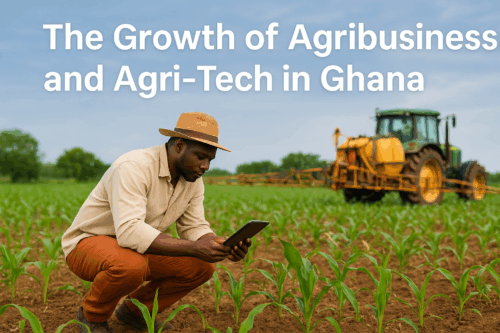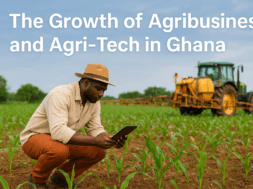The Growth of Agribusiness and Agri-Tech in Ghana

The Rise of Agribusiness in Ghana
Agriculture has always been the backbone of Ghana’s economy. From cocoa farms in the Ashanti Region to rice fields in the Northern Region, the sector sustains millions of livelihoods. In recent years, agribusiness and agri-tech have emerged as powerful engines driving transformation. With modern technologies, youth-led startups, and stronger investment support, Ghana is positioning itself as a hub for sustainable and innovative agriculture.
Agriculture’s Role in Ghana’s Economy
Contribution to GDP and Employment
Agriculture contributes about 20% of Ghana’s GDP and provides employment for nearly 44% of the population, particularly in rural communities. The sector remains crucial in ensuring food security and reducing poverty. Commodities such as cocoa, cashew, and horticultural products are major export earners, strengthening Ghana’s global trade presence.
Support from MoFA and FAO Ghana
Institutions like the Ministry of Food and Agriculture (MoFA) and FAO Ghana continue to introduce initiatives aimed at boosting productivity and improving farmer livelihoods. Their programs support mechanization, sustainable farming practices, and rural development, ensuring agriculture remains resilient.
Modern Farming Methods in Ghana
Mechanized Farming and Irrigation
Traditional farming methods are gradually giving way to mechanization. The use of tractors, harvesters, and irrigation systems has helped increase yields while reducing manual labor. Government-backed irrigation projects also ensure year-round farming, particularly in regions vulnerable to erratic rainfall.
Precision Farming with Drones and Sensors
Smart farming technologies are gaining momentum. Farmers now deploy drones for aerial mapping, crop monitoring, and pest detection. Sensors help track soil moisture levels and nutrient deficiencies, enabling precise application of water and fertilizers. These innovations are leading to better productivity and reduced resource waste.
Improved Seeds and Fertilizers
Organizations like IFDC Ghana and AGRA (Alliance for a Green Revolution in Africa) promote improved seed varieties and fertilizer use. These inputs enhance resilience against pests and climate shocks while increasing yields, empowering farmers to meet both domestic and export demand.
Agri-Tech Innovations and Digital Solutions
Mobile Platforms: Esoko and Farmerline
Digital platforms such as Esoko and Farmerline are transforming agriculture by providing farmers with real-time market prices, weather forecasts, and extension services. With mobile penetration in rural Ghana, these platforms ensure farmers make informed decisions and secure fair prices for their produce.
E-commerce Platforms: AgroCenta
Platforms like AgroCenta connect smallholder farmers directly to buyers, eliminating middlemen. This ensures better income for farmers while supplying quality produce to markets. Such e-commerce solutions are bridging the gap between farm and consumer.
Data-Driven Farming for Higher Yields
Data analytics is reshaping farming practices. From planting cycles to fertilizer application, farmers now use data-driven insights to improve efficiency. This has proven critical in boosting yields and minimizing risks in the face of climate variability.
You can also read on: https://baobabentrepreneur.com/growafrica-startup-incubation-cohort-1-turning-green-ideas-into-impactful-businesses/
Youth in Agribusiness
Rising Young Agripreneurs
Young Ghanaians are increasingly viewing agriculture as a profitable venture rather than a last resort. Startups led by youth are leveraging innovation to tackle challenges in food production, storage, and distribution. These agripreneurs are reshaping the sector with fresh ideas.
Government and NGO Support Programs
Initiatives by MoFA, FAO Ghana, and AGRA are equipping youth with training, grants, and access to resources. Incubation hubs and startup accelerators are also nurturing young agripreneurs to build scalable ventures.
Challenges Facing Young Entrepreneurs
Despite opportunities, young entrepreneurs face challenges such as limited access to finance, high input costs, and land acquisition difficulties. Addressing these barriers remains crucial to sustaining youth-led agribusiness growth.
Technology Tackling Post-Harvest Losses
Storage Innovations: Cold Rooms and Silos
Post-harvest losses account for nearly 30–40% of annual harvests in Ghana. Innovations like solar-powered cold rooms and modern silos help farmers preserve crops longer, reducing waste and improving profitability. Organizations like NAFCO (National Food Buffer Stock Company) are instrumental in stabilizing food storage and prices.
Digital Logistics and Supply Chains
Digital logistics platforms streamline the transport of farm produce from rural areas to urban markets. By reducing inefficiencies in distribution, farmers earn more while consumers benefit from fresher produce.
Blockchain for Product Traceability
Blockchain is revolutionizing the traceability of crops like cocoa and cashew. It provides transparency in supply chains, ensuring Ghanaian produce meets international standards and building trust with global buyers.
Investment and Financing Opportunities
Crowdfunding Platforms like Kwidex
Access to finance is a major barrier for farmers. Platforms such as Kwidex allow individuals to invest in farming projects, giving farmers the capital they need to expand operations while offering investors returns on their contributions.
Government and World Bank Programs
Government-backed schemes and World Bank Ghana initiatives provide loans, subsidies, and grants to farmers. These programs enhance access to inputs, machinery, and training for smallholder farmers.
Private Sector and Investor Partnerships
Private investors and banks are increasingly seeing agribusiness as a profitable sector. Partnerships help scale innovations, finance startups, and support agritech expansion across Ghana.
Future of Agribusiness in Ghana
Climate-Smart Agriculture
With climate change affecting rainfall and crop cycles, climate-smart agriculture is the future. Farmers are adopting techniques such as crop rotation, drought-resistant varieties, and sustainable water management to ensure resilience.
Export Opportunities for Cocoa, Cashew, and Horticulture
Ghana’s traditional cash crops—cocoa, cashew, and horticultural produce—hold significant export potential. With improved traceability and quality standards, Ghana can expand its presence in global markets.
Policy Directions and AfCFTA Integration
The African Continental Free Trade Area (AfCFTA) opens vast opportunities for regional integration. Ghana’s agribusinesses can now access larger markets across Africa, boosting trade and investment in agriculture.
Case Studies of Agri-Tech Success in Ghana
Esoko: Empowering Farmers with Information
Esoko has been one of the pioneers in Ghana’s digital agriculture revolution. By providing SMS-based market prices, weather updates, and advisory services, it bridges the information gap for smallholder farmers. Farmers who previously sold their produce at low prices now negotiate better, thanks to accurate data.
Farmerline: Connecting Farmers to Knowledge and Markets
Farmerline extends digital solutions beyond information. Through its mobile platform, it connects farmers to financial services, quality inputs, and training. Its model has empowered thousands of farmers to adopt modern techniques and increase productivity.
AgroCenta: Linking Farmers to Buyers
AgroCenta tackles one of the most significant challenges—market access. By offering an online marketplace, it connects rural farmers to bulk buyers, ensuring fair prices. The platform also integrates digital finance, giving farmers access to credit for scaling operations.
The Role of Agribusiness in Food Security
Ensuring Consistent Food Supply
With rising population growth, Ghana faces increasing food demand. Agribusiness ventures are crucial in bridging the supply gap. Mechanized farming and improved irrigation ensure farmers can produce food consistently throughout the year.
Reducing Import Dependency
Ghana imports large quantities of rice, poultry, and other staples. Expanding local agribusiness reduces dependency on imports, strengthens the cedi, and ensures food security.
Enhancing Nutrition and Health
Beyond quantity, agribusiness innovations promote diverse diets through horticulture, livestock, and aquaculture, contributing to improved nutrition and public health.
The Role of Institutions and Global Partnerships
Ministry of Food and Agriculture (MoFA)
MoFA has been pivotal in policies supporting mechanization, extension services, and farmer education. Programs such as Planting for Food and Jobs have boosted food production nationwide.
Ghana Commodity Exchange (GCX)
GCX provides a regulated marketplace where farmers can trade crops at fair and transparent prices. It reduces exploitation by middlemen and promotes fair competition.
NAFCO and Buffer Stock Management
The National Food Buffer Stock Company plays a critical role in reducing food waste and stabilizing prices by purchasing surplus crops for storage and redistribution.
International Support
Partners like the World Bank Ghana, AGRA, and IFDC Ghana provide financial, technical, and policy support. These collaborations strengthen farmer resilience and drive sustainable growth.
How Technology is Transforming Smallholder Farming
Access to Finance Through Digital Platforms
Digital finance platforms such as Kwidex have opened new opportunities for smallholders. By connecting them with micro-investors, farmers gain capital to expand production while investors enjoy returns on agricultural projects.
Precision Agriculture Tools
Smartphones, drones, and soil sensors are becoming more accessible. Even small farms can now leverage precision farming tools to reduce waste and optimize resources.
Mobile Learning and Advisory Services
Farmers in remote areas benefit from training delivered via mobile phones. This ensures that even without direct access to extension officers, they receive guidance on pest control, planting schedules, and best practices.
The Global Context: Ghana’s Agribusiness on the World Stage
Rising Demand for Cocoa and Cashew
Ghana remains the world’s second-largest producer of cocoa. With sustainability certification and blockchain-enabled traceability, Ghanaian cocoa is gaining higher value in international markets. Similarly, cashew exports are growing rapidly, with processing facilities adding value locally.
Horticulture and Fresh Produce
Beyond cash crops, Ghana is emerging as a supplier of pineapple, mango, and vegetables to Europe and other regions. Agribusiness investments in cold storage and logistics are making exports more competitive.
AfCFTA Opportunities
The African Continental Free Trade Area (AfCFTA) provides Ghanaian agribusinesses access to a larger African market of over 1.3 billion people. Regional integration is set to boost trade in processed foods, grains, and agro-products.
Sustainability and Climate-Smart Approaches
Tackling Climate Change
Ghana is experiencing shifting rainfall patterns and higher temperatures. Climate-smart agriculture—such as drought-resistant seeds, efficient irrigation, and conservation agriculture—is becoming a necessity.
Promoting Organic and Eco-Friendly Farming
The demand for organic food is growing locally and internationally. Agribusinesses adopting eco-friendly practices not only protect the environment but also capture premium markets.
Agroforestry and Land Management
Blending tree planting with farming improves soil fertility, prevents erosion, and supports biodiversity, making agroforestry a key tool for sustainability.
Recommendations for Driving Agribusiness Growth
Encouraging More Youth Participation
Agriculture must be repositioned as an attractive career path for Ghana’s youth. This requires mentorship programs, startup incubators, and access to modern farming technologies. Highlighting success stories of young agripreneurs helps inspire others to explore the sector.
Strengthening Agri-Tech Infrastructure
Digital agriculture thrives on connectivity. Expanding internet access in rural areas, promoting affordable smartphones, and investing in rural tech hubs will accelerate adoption of agri-tech innovations.
Promoting Public-Private Partnerships (PPPs)
Partnerships between government agencies, NGOs, private investors, and research institutions can deliver scalable solutions. For example, PPPs can fund solar-powered irrigation systems, farmer training, and agribusiness hubs.
Boosting Access to Finance
More farmers need access to affordable loans, insurance products, and crowdfunding platforms like Kwidex. Financial literacy training can also help farmers manage resources effectively and attract investment.
Investing in Value Addition
Instead of exporting raw produce, Ghana should expand local processing of cocoa, cashew, shea butter, and horticultural products. This increases export revenue, creates jobs, and strengthens the manufacturing sector.
Key Takeaways for Stakeholders
- Farmers: Embrace digital tools and training to increase efficiency.
- Youth: Leverage agribusiness as a viable career and entrepreneurship path.
- Investors: Explore high-potential agribusiness startups and projects in Ghana.
- Government: Continue creating favorable policies, subsidies, and incentives for agribusiness growth.
- Development Partners: Support climate-smart practices, training programs, and digital transformation in agriculture.
Final Thoughts
Agriculture has always been the backbone of Ghana’s economy, but agribusiness and agri-tech are redefining its future. With innovation, investment, and inclusivity, the sector can transform rural livelihoods, reduce food imports, and make Ghana a leader in Africa’s green revolution.
For young innovators, entrepreneurs, and investors, now is the time to seize the opportunities in Ghana’s agribusiness ecosystem. The growth potential is immense, and with the right strategies, Ghana can achieve sustainable agricultural transformation that benefits both local communities and the global market.
Conclusion
The growth of agribusiness and agri-tech in Ghana is shaping a new era of prosperity. With smart farming technologies, youth-led startups, global partnerships, and government support, agriculture is transitioning from subsistence to a modern, tech-driven industry.
The future promises greater food security, export growth, and sustainable practices that will strengthen Ghana’s role in Africa’s agricultural revolution. For farmers, entrepreneurs, and investors, the opportunities in Ghana’s agribusiness sector are limitless.
















